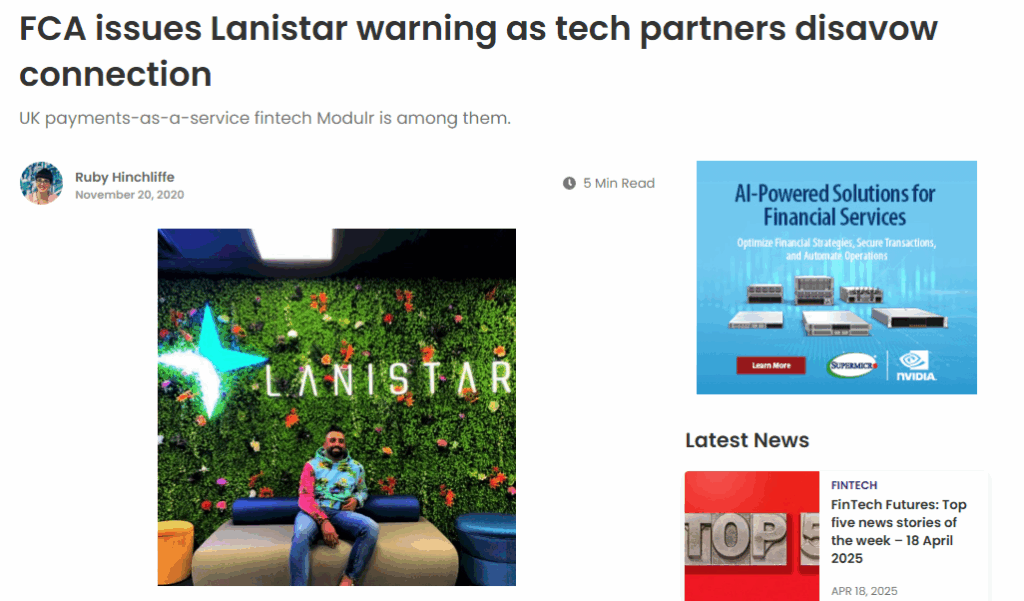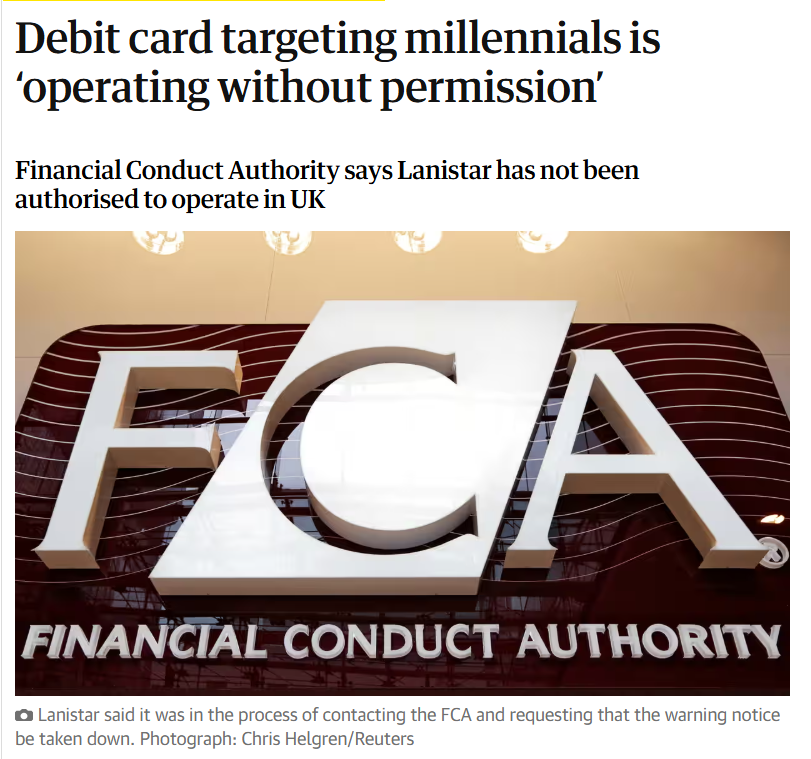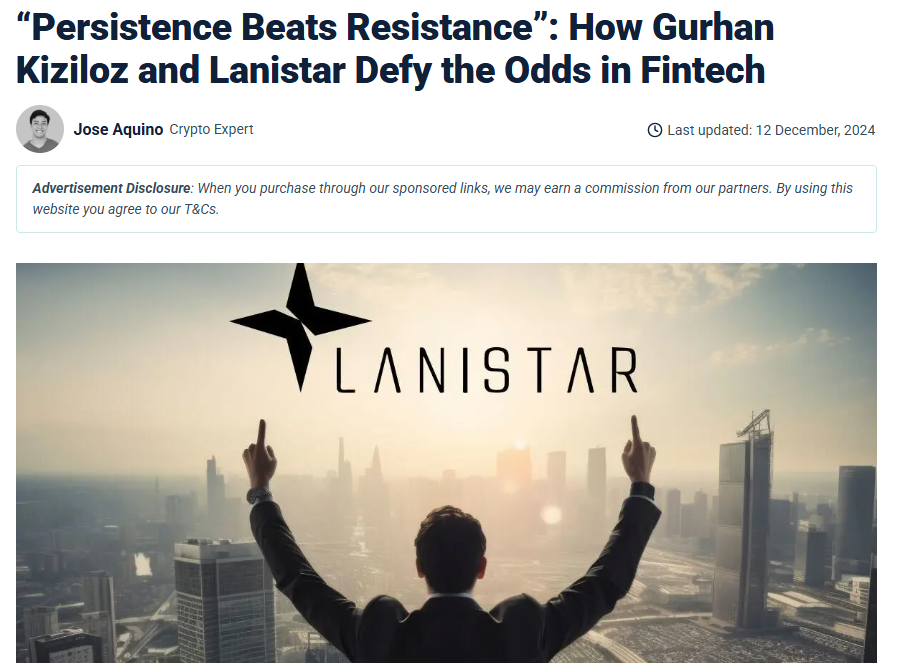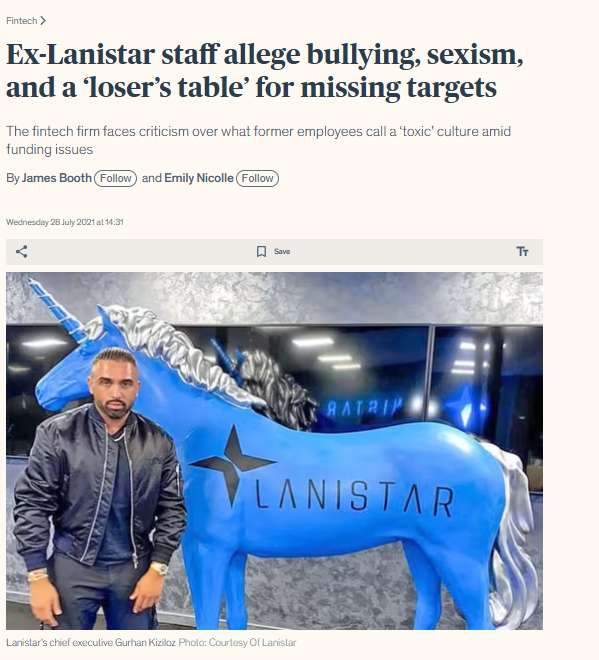Introduction: A Glitzy Launch, a Regulatory Firestorm
In the high-octane world of fintech, few names have burst onto the scene with as much flash—and controversy—as Lanistar. Touting a revolutionary new debit card and riding a wave of celebrity endorsements, the UK-based startup quickly grabbed headlines with its promises of secure, polymorphic technology and stylish financial services.
But beneath the Instagram glitter and bold PR statements lies a story fraught with regulatory breaches, misleading claims, disavowals from key partners, and murky financial dealings. Most recently, the Financial Conduct Authority (FCA) issued—and swiftly retracted—a public warning against Lanistar, bringing its entire operation under the microscope.
This article dives deep into Lanistar’s rise, the backlash it’s now facing, and what it means for consumers, partners, and the fintech sector at large.
Founded with the ambition to disrupt the payments industry, Lanistar pitched itself as a fintech innovator. CEO Gurhan Kiziloz promised users the “most secure card in the world,” powered by polymorphic technology that could link up to eight different cards in one device.
At first glance, it seemed like a hybrid between London-based Curve and futuristic mobile banking. The offering was meant to appeal to young, tech-savvy consumers who valued convenience, luxury, and security—an image bolstered by heavy influencer marketing.
But from day one, the company’s strategy leaned more into branding than banking. The glitzy influencer-led rollout in November 2020 flooded Instagram with celebrity endorsements, including posts from high-profile figures such as:
Demi Rose (15M followers)
Georgina Rodriguez (21.9M)
Karim Benzema (36.4M)
Tommy Fury, Chris Hughes, Amber Rose Gill, and others
The card itself hadn’t even launched, yet the campaign implied full functionality, readiness, and—critically—a level of credibility that regulators would soon question

FCA Warning and the Regulatory Fallout
On November 17, 2020, the UK’s Financial Conduct Authority (FCA) added Lanistar to its warning list, cautioning consumers about potential “investment scams.” The regulator made it clear: Lanistar was not registered or authorized to offer financial services in the UK.
In its official statement, the FCA emphasized that “almost all firms and individuals offering, promoting or selling financial services or products in the UK have to be authorized by us.” Lanistar didn’t meet this basic criterion.
To make matters worse, the firm was reportedly presenting itself in a way that could easily mislead customers into believing it was regulated. The warning sparked immediate backlash from partners and tech providers.

Partners Back Away
Following the FCA’s warning, a number of Lanistar’s alleged partners scrambled to distance themselves from the fintech. Chief among them was Modulr, a prominent payments-as-a-service provider in the UK.
In a statement released shortly after the FCA’s alert, Modulr clarified that Lanistar had not completed their due diligence process, and more importantly, “does not have any right to refer to Modulr or suggest that it has the right to provide regulatory services on behalf of Modulr.”
The company further added that any press linking Lanistar with Modulr had been published without their consent, and that Lanistar could not use their name unless and until officially approved as a partner.
Other notable mentions included:
Mastercard: Confirmed it was working through Lanistar’s sponsor banks, not directly with Lanistar.
Jumio: Stated it did not possess specific details on Lanistar’s claims.
Global Processing Services (GPS): Reaffirmed that no cards had been issued yet.
Transact Payments Limited (TPL): A Gibraltar-based issuer, was named as a partner, but offered no public endorsement.
It became increasingly clear that Lanistar was building its image on assumed or aspirational partnerships, rather than finalized and functional ones.

Marketing First, Compliance Later
The FCA’s issue wasn’t just about Lanistar’s lack of authorization—it was the timeline. Lanistar had dumped enormous capital into its influencer campaign without securing the appropriate approvals. This “marketing-first” approach is a red flag in a highly regulated industry like fintech.
While the startup eventually added a disclaimer to its marketing material stating that it was “not regulated”, the damage had already been done. The FCA removed its public warning just two days later, but only after Lanistar agreed to amend its communications.
This quick reversal left many in the industry scratching their heads. Why issue such a severe warning, only to walk it back days later?
The answer likely lies in Lanistar’s aggressive PR machine—which pivoted instantly to damage control, issuing press releases, influencer rebuttals, and behind-the-scenes lobbying.
Influencer Fallout and Share Promises
Lanistar’s influencer strategy came with its own set of complications. It wasn’t just about paid Instagram posts—some influencers were reportedly offered company shares in exchange for promotion, under the condition they sign non-disclosure agreements (NDAs).
One notable example was influencer TGE, who revealed on his podcast that he signed a contract in May 2020 but backed out after doing his own investigation into the company.
Such arrangements could violate advertising and financial promotion laws, especially if shares were offered without proper disclosures. It also blurs the line between genuine promotion and deceptive marketing—an issue that regulators are increasingly wary of.

Ownership and Investment Red Flags
Adding to the skepticism around Lanistar is the lack of transparency in its corporate structure and funding. For a company that claimed a £150 million valuation, its backstory is surprisingly thin.
Initially, Lanistar stated that it received a £15 million investment from Milaya Capital, which would have equated to a 10% stake. But just months later, the company’s new PR firm informed journalists that Milaya Capital was no longer involved.
The capital, they now claimed, came from CEO Gurhan Kiziloz’s family—a narrative shift that raised more questions than answers.
Further scrutiny revealed that Kiziloz does not appear to hold any shares in Lanistar, according to Companies House. Instead, ownership traces back to Gursel Niyazi, a fellow director, and Soner Demiralay, who also holds directorships in two other recently founded firms.
These inconsistencies paint a picture of a company with unclear leadership and possibly precarious financial footing—despite bold public valuations and hiring claims.
Growth or Illusion?
In its latest press materials, Lanistar claims it now employs 400 people, up from 145 in June 2020. It has also launched a “compliance hub” in Athens, Greece, ostensibly to bolster its regulatory credibility.
But these rapid expansions have not been independently verified. The nature of these employees—whether full-time staff, contractors, or temporary workers—remains unclear.
Meanwhile, its flagship product—the polymorphic card—still hasn’t reached the Market.
Is the Polymorphic Card Even Real?
One of the central pillars of Lanistar’s pitch is its “polymorphic” technology—a term CEO Kiziloz described as allowing users to link multiple bank cards into one. He even told Forbes:
“Our bank card has a polymorphic ability, allowing you to link up to eight bank cards into one card. It is perfect for those who travel constantly.”
This description closely mirrors the core functionality of Curve, another UK fintech company.
But unlike Curve, which is a licensed and functioning business, Lanistar has been secretive about the technical specifics of its offering. To date, no demonstration of this polymorphic technology has been released, nor have any cards been issued to customers.
The lack of transparency around the tech, combined with a focus on aesthetics over functionality, leads many to question whether the product is ready—or even real.
Conclusion: A Fintech Mirage?
Lanistar’s story is a cautionary tale of fintech ambition untethered from regulatory reality. It highlights the dangers of launching high-profile campaigns before securing licenses, vetting partners, or finalizing products.
It also reflects a broader trend in the industry—where hype and image sometimes eclipse substance and compliance.
Whether Lanistar will recover from this wave of scrutiny remains to be seen. The company says it’s still pursuing FCA approval and plans to release cards. But with multiple partners backing away and no working product in hand, it’s an uphill battle.
For consumers, regulators, and partners alike, Lanistar serves as a reminder that in fintech, style should never come before substance.






